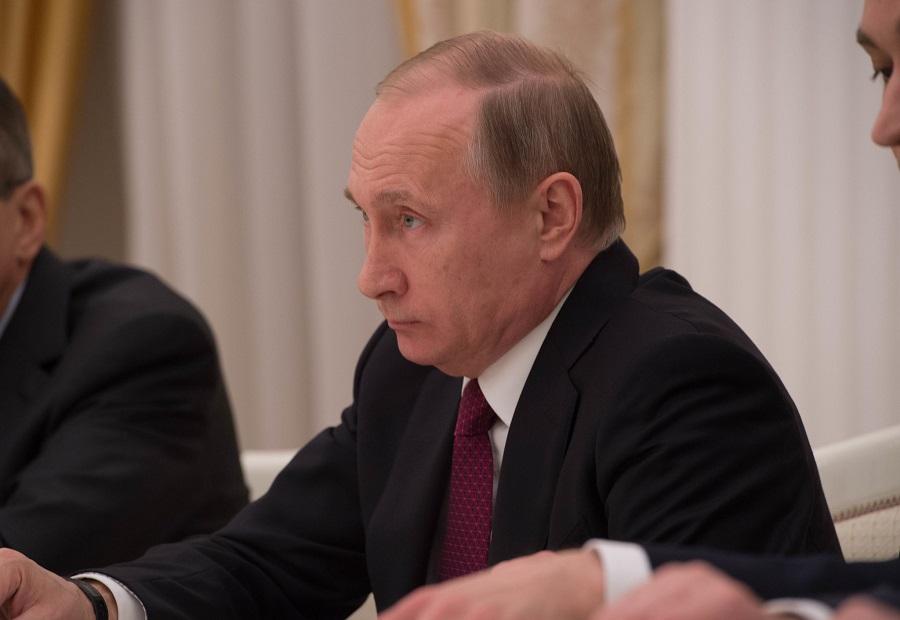Calling Vladimir Putin names can really cost a hefty amount of money. A 34-year-old man in Russia becomes one of the first people to be penalized for unfavorable remarks on the Russian President. A local court ordered him on Monday to pay the fine of 30,000 Russian Rubles, about $470, for reportedly calling Putin a “f***wit” online.
Yuri Kartyzhev, a resident of Malaya Vishera in the country’s Novgorod region, purportedly posted through the Russian social media platform VKontakte the following message, “Putin is an unbelievable f***wit.” Kartyzhev told Meduza that his original post censored the expletive word just as shown here.
He insisted that authorities might have hacked into his account to spell out the word that ultimately led to the court decision. Kartyzhev brought this argument to the court but it reportedly did not impress the judge overseeing his case. Meduza added that this particular testimony of the defendant was seen as a “confession of guilt” but does not show regret of his action.
The court’s decision was made possible by new laws that Putin signed in March focused on cyber-related matters making it illegal for people in Russia to insult government officials and allows the state to ban the spread of fake news. However, critics of the Putin administration are concerned that the law would just restrict the people’s freedom of speech online. Meanwhile, Kartyzhev will most likely set a precedent to other Russians who might want to vent their dissent towards their government through online platforms.
Meanwhile, more are getting concerned following the court’s decision on Kartyzhev such as Russian lawyer Pavel Chikov, who is also the head of the association of human rights organization called AGORA. Chikov told the same publication that the laws passed in March were “obviously” meant to protect Putin. “From there, everything moves in concentric circles: it’s posts about State Duma Speaker [Vyacheslav] Volodin, Prime Minister [Dmitry] Medvedev, and other public figures who often attract all the latest words on the Internet,” Chikov added.



 India–U.S. Interim Trade Pact Cuts Auto Tariffs but Leaves Tesla Out
India–U.S. Interim Trade Pact Cuts Auto Tariffs but Leaves Tesla Out  Netanyahu to Meet Trump in Washington as Iran Nuclear Talks Intensify
Netanyahu to Meet Trump in Washington as Iran Nuclear Talks Intensify  U.S. Lawmakers to Review Unredacted Jeffrey Epstein DOJ Files Starting Monday
U.S. Lawmakers to Review Unredacted Jeffrey Epstein DOJ Files Starting Monday  Ohio Man Indicted for Alleged Threat Against Vice President JD Vance, Faces Additional Federal Charges
Ohio Man Indicted for Alleged Threat Against Vice President JD Vance, Faces Additional Federal Charges  U.S. to Begin Paying UN Dues as Financial Crisis Spurs Push for Reforms
U.S. to Begin Paying UN Dues as Financial Crisis Spurs Push for Reforms  Jack Lang Resigns as Head of Arab World Institute Amid Epstein Controversy
Jack Lang Resigns as Head of Arab World Institute Amid Epstein Controversy  Trump Administration Appeals Court Order to Release Hudson Tunnel Project Funding
Trump Administration Appeals Court Order to Release Hudson Tunnel Project Funding  TrumpRx.gov Highlights GLP-1 Drug Discounts but Offers Limited Savings for Most Americans
TrumpRx.gov Highlights GLP-1 Drug Discounts but Offers Limited Savings for Most Americans  Israel Approves West Bank Measures Expanding Settler Land Access
Israel Approves West Bank Measures Expanding Settler Land Access  Japan’s Prime Minister Sanae Takaichi Secures Historic Election Win, Shaking Markets and Regional Politics
Japan’s Prime Minister Sanae Takaichi Secures Historic Election Win, Shaking Markets and Regional Politics  Japan Election 2026: Sanae Takaichi Poised for Landslide Win Despite Record Snowfall
Japan Election 2026: Sanae Takaichi Poised for Landslide Win Despite Record Snowfall  Trump’s Inflation Claims Clash With Voters’ Cost-of-Living Reality
Trump’s Inflation Claims Clash With Voters’ Cost-of-Living Reality  New York Legalizes Medical Aid in Dying for Terminally Ill Patients
New York Legalizes Medical Aid in Dying for Terminally Ill Patients  Trump Allows Commercial Fishing in Protected New England Waters
Trump Allows Commercial Fishing in Protected New England Waters  Pentagon Ends Military Education Programs With Harvard University
Pentagon Ends Military Education Programs With Harvard University  Trump Backs Nexstar–Tegna Merger Amid Shifting U.S. Media Landscape
Trump Backs Nexstar–Tegna Merger Amid Shifting U.S. Media Landscape  Nicaragua Ends Visa-Free Entry for Cubans, Disrupting Key Migration Route to the U.S.
Nicaragua Ends Visa-Free Entry for Cubans, Disrupting Key Migration Route to the U.S. 































